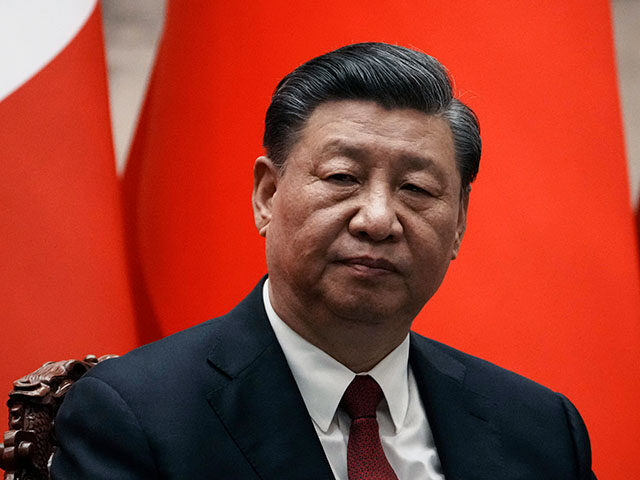The U.S. Department of Agriculture formally announced its National Farm Security Action Plan on Tuesday, rallying top Trump administration officials, Republican governors, and lawmakers around a resolute effort to protect American farmland, food supply chains, and agricultural research from foreign threats, especially Communist China.
“American agriculture, in American hands, is a positive good,” said Agriculture Secretary Brooke Rollins. “Every family, every home, every community, depends upon what our farmers do, and they support and sustain us, not merely by keeping us materially fed, but by keeping us spiritually strong. That’s exactly why it is under threat—from criminals, political adversaries, and hostile regimes.”
In addition to unveiling the USDA National Farm Security Action Plan, Rollins revealed she is now officially a member of the Committee on Foreign Investment in the United States (CFIUS). Sen. Tommy Tuberville (R-AL), who has pushed for her inclusion, described CFIUS as “a group of high-ranking Cabinet members in the White House that determine who buys what” and insisted the agriculture secretary needs to be at the table “to protect our farmland.” Sen. Roger Marshall (R-KS) echoed that support.
Counselor to the President Peter Navarro warned that the Chinese Communist Party has used American supply chains and food systems as weapons against the United States. “We’re the United States, but they treat us like a colony,” Navarro asserted, pointing to the Chinese acquisition of Smithfield Foods and Syngenta. “Seeds really can be the revolution that keeps the world fed—and China now owns a key part of it.”
Attorney General Pam Bondi shared that two Chinese nationals were recently charged in Michigan for attempting to smuggle potential agroterrorism weapons into the country. Soon after, a Chinese citizen was arrested for sending packages of concealed biological materials into the United States. “We will prosecute you. We will hold you accountable,” Bondi vowed, adding that the FBI has opened over 100 biosmuggling investigations in recent years.
Defense Secretary Pete Hegseth underscored the national security stakes of foreign land purchases near U.S. military installations. “As someone who’s charged with leading the Defense Department, I want to know who owns the land around our bases and strategic bases. We would be asleep at the wheel if we were not fully a party to an effort like this to ensure that our nation had the food supply it needs. No longer can foreign adversaries assume we’re not watching and we’re not paying attention and we’re not doing something about it.”
Homeland Security Secretary Kristi Noem, a lifelong farmer and rancher, emphasized that her experience shaped her belief that food policy is national security policy. “A country that cannot feed itself, cannot take care of itself, and cannot provide for itself, is not secure, and we have to be able to feed ourselves to make sure that no other country ever controls us,” Noem declared. “In South Dakota, China does not own any of our land, nor will they ever own any of our land.”
Gov. Sarah Huckabee Sanders (R-AR) recounted how Arkansas became the first state in the nation to kick a Chinese-owned company off its farmland and passed new laws blocking foreign land purchases near military installations and critical infrastructure. “A country has to be able to feed itself, fuel itself, and fight for itself to truly be free,” she stated.
Gov. Jim Pillen (R-NE) explained that Nebraska has taken aggressive action to push Chinese companies out, beginning with legislation passed in 2023 to remove all Chinese equipment from telecommunications systems statewide. “That was the first step,” Pillen said. “Second step was making sure that no land is purchased by any foreign adversaries in the state of Nebraska. Third step is simply that we have direct conversations with companies that are from China.” He added that he personally refused to meet with representatives from Syngenta and urged them to leave the state. “I have no interest in you being in Nebraska. My suggestion would be to get a different job.” Pillen confirmed that Syngenta had sold its Nebraska operations to a family-owned U.S. genetic company.
Tuberville stressed that foreign adversaries own over two million acres of farmland in Alabama alone. “They are dominating us in almost everything that they do, because we’ve sat back and the politicians have been counting their money instead of doing what’s right and helping this country stay in the front,” the senator argued. “We’ve got to be number one. We can’t be number two. We’ve got to fight back. They are coming into our country and buying our farmland.”
Congressman GT Thompson (R-PA) noted that the One Big Beautiful Bill included historic investments across the agricultural value chain, strengthening biosecurity, providing tax relief, and supporting affordable energy policies to keep family farms running and food prices low. He pointed to foreign threats, intellectual property theft, and high energy costs as among the major challenges facing America’s farmers.
Rollins affirmed that the USDA will prioritize American-made research and revoke certifications for foreign entities tied to adversarial regimes like China, North Korea, Iran, and Russia. “The red states are the ones that are banning the Chinese-owned farmland, and this is true,” she affirmed. “But I have to believe that Democrat governors and even the blue states realize what a massive threat this is to national security and how important it is. We plan to work with everyone, no matter which party, no matter which side of the aisle they’re from, to ensure that the people of this country and our agriculture farmland is protected.”
Marshall contended that Chinese land ownership is just a small piece of a much larger threat. He pointed to foreign control over as much as a fourth of America’s protein processing industry through companies like JBS and Smithfield, as well as ongoing intellectual property theft by Chinese researchers operating inside U.S. universities. “What really keeps me awake is bioterrorism,” Marshall cautioned, describing a scenario in which a Wuhan lab-engineered virus wipes out global livestock while adversaries protect their own with exclusive mRNA vaccines. “That’s why I’m a big proponent of the work being done in Manhattan, Kansas at the National Bio and Agro-Defense Facility. The biggest active threat I see is bioterrorism.”
Rollins previously told Breitbart News the Trump administration is exploring a federal solution to stop China from buying American farmland, calling it “one of the very, very top” national security priorities and warning that much of the land is located near U.S. military outposts.




